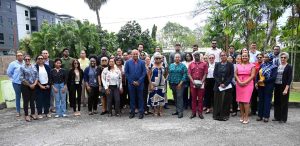By Brendon Butts
IN today’s digitally driven world, the role of technology in education cannot be understated.
For a small developing nation like ours, embracing technological advancements and fostering innovation is not just a choice but a necessity for future prosperity.
In this post, we aim to make a compelling case for the integration of a Computer Science and Coding Curriculum with a STEAM (Science, Technology, Engineering, Arts, and Mathematics) approach in our primary schools, highlighting its potential impact on economic growth, innovation, and overall prosperity.
Whilst we recognise and take note of the MOE’s recent 2023-2027 Education Policy document, we are strongly suggesting a much more aggressive approach in the areas of STEAM, Coding and Computer Science than those outlined in the document.
Focused Expertise
A dedicated Computer Science and Coding Curriculum in primary schools will equip our young learners with essential digital skills. A dedicated Computer Science and Coding Curriculum allows for in-depth exploration of these essential skills.
Rather than being a peripheral aspect of various subjects, students get concentrated exposure to coding, algorithms, problem-solving, and computational thinking.
This focused expertise is essential for fostering a deep understanding and proficiency in the digital age. In a rapidly evolving technological landscape, these skills are indispensable for the future workforce. By introducing computer science concepts from an early age, we prepare our students to be future leaders in technology-driven industries.
Fostering Innovation and Entrepreneurship
STEAM education encourages creativity and problem-solving. When combined with computer science and coding, it ignites the spark of innovation among our youth. Trinidad and Tobago has a wealth of untapped talent, and by nurturing innovative thinking, we can unleash the potential for groundbreaking solutions to local challenges.
These innovations can drive economic growth and position our nation on the global stage as a hub for technological entrepreneurship. A dedicated curriculum ensures that students are equipped with the skills and knowledge needed to thrive in a tech-driven world. This not only prepares them for potential careers in STEM fields but also enhances their adaptability across various domains.

Attracting Foreign Investment
Investors are drawn to countries with a skilled workforce. By prioritizing a Computer Science and Coding Curriculum with a STEAM approach, Trinidad and Tobago becomes an attractive destination for foreign investments in technology-related industries. This influx of capital can stimulate economic growth, create job opportunities, and elevate our standing in the global economy.
Bridging the Digital Divide
Incorporating computer science and coding into primary education ensures that no child is left behind in the digital age.
This approach promotes inclusivity and bridges the digital divide, regardless of socio-economic background.
By providing equal access to technology education, we lay the foundation for a more equitable society and a brighter future for all.
The computer science program must go beyond keyboarding and basic digital literacy skills. A dedicated curriculum ensures that every student has an equal opportunity to learn computer science and coding, irrespective of their background or the resources available to their school.
Global Competitiveness
To compete effectively on the world stage, Trinidad and Tobago must invest in education that aligns with global trends. A Computer Science and Coding Curriculum within a STEAM framework positions our students to excel in international assessments and equips them with the skills needed to take on global challenges. This, in turn, enhances our nation’s overall competitiveness. To remain competitive on a global scale, countries must produce a workforce with strong digital literacy. A dedicated Computer Science and Coding Curriculum ensures that a nation’s education system aligns with the demands of the global economy, attracting investment and opportunities.
Job Creation and Reducing Brain Drain
With a strong focus on technology education, we can create a pool of highly skilled professionals who can contribute to the growth of local tech industries. This can significantly reduce the brain drain phenomenon, where talented individuals seek opportunities abroad. Instead, we can foster an environment where the best and brightest choose to stay and contribute to our nation’s development.
Teacher Preparation
A dedicated curriculum necessitates the training and professional development of teachers in computer science and coding education. This not only equips educators with the necessary skills but also ensures high-quality instruction. Moreover, ongoing training ensures that teachers remain up-to-date with the rapidly evolving field of technology, allowing them to adapt their teaching methods and materials accordingly. By investing in teacher upskilling, we empower our educators to empower our students, laying a solid foundation for the future of Trinidad and Tobago’s technological progress and innovation.
In conclusion, the case for a Computer Science and Coding Curriculum with a STEAM approach in primary schools in Trinidad and Tobago is clear and compelling. It is an investment in our nation’s future that can lead to economic growth, innovation, prosperity, and global competitiveness. By providing our youth with the tools to excel in technology and fostering a culture of innovation, we pave the way for a brighter future where Trinidad and Tobago shines as a beacon of technological advancement and opportunity. It’s time to unlock our potential and embrace a future driven by knowledge, innovation, and digital literacy.
Brendon Butts (Dip/Med) is the Managing Director of Education Solution Specialists
![]()














